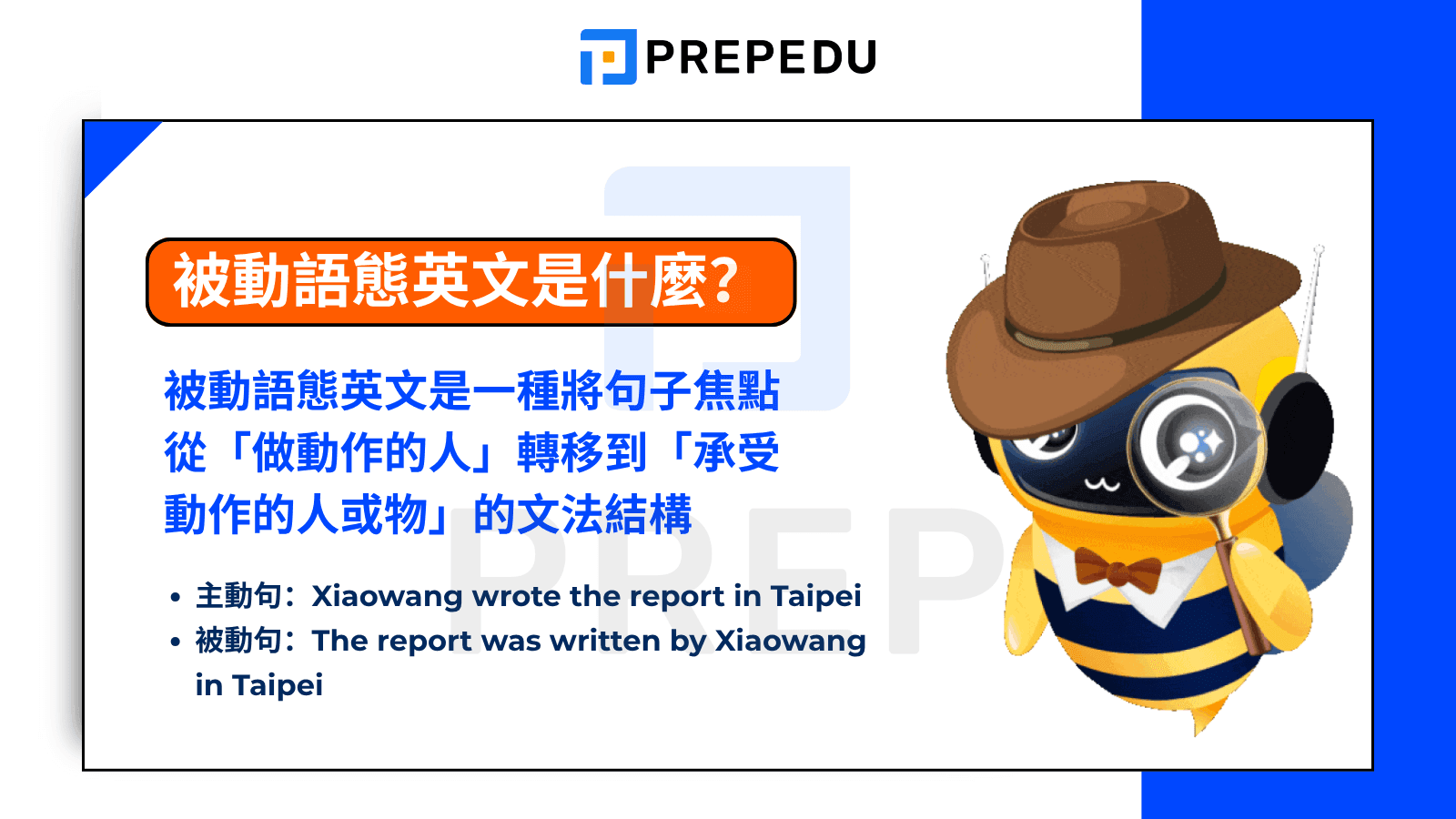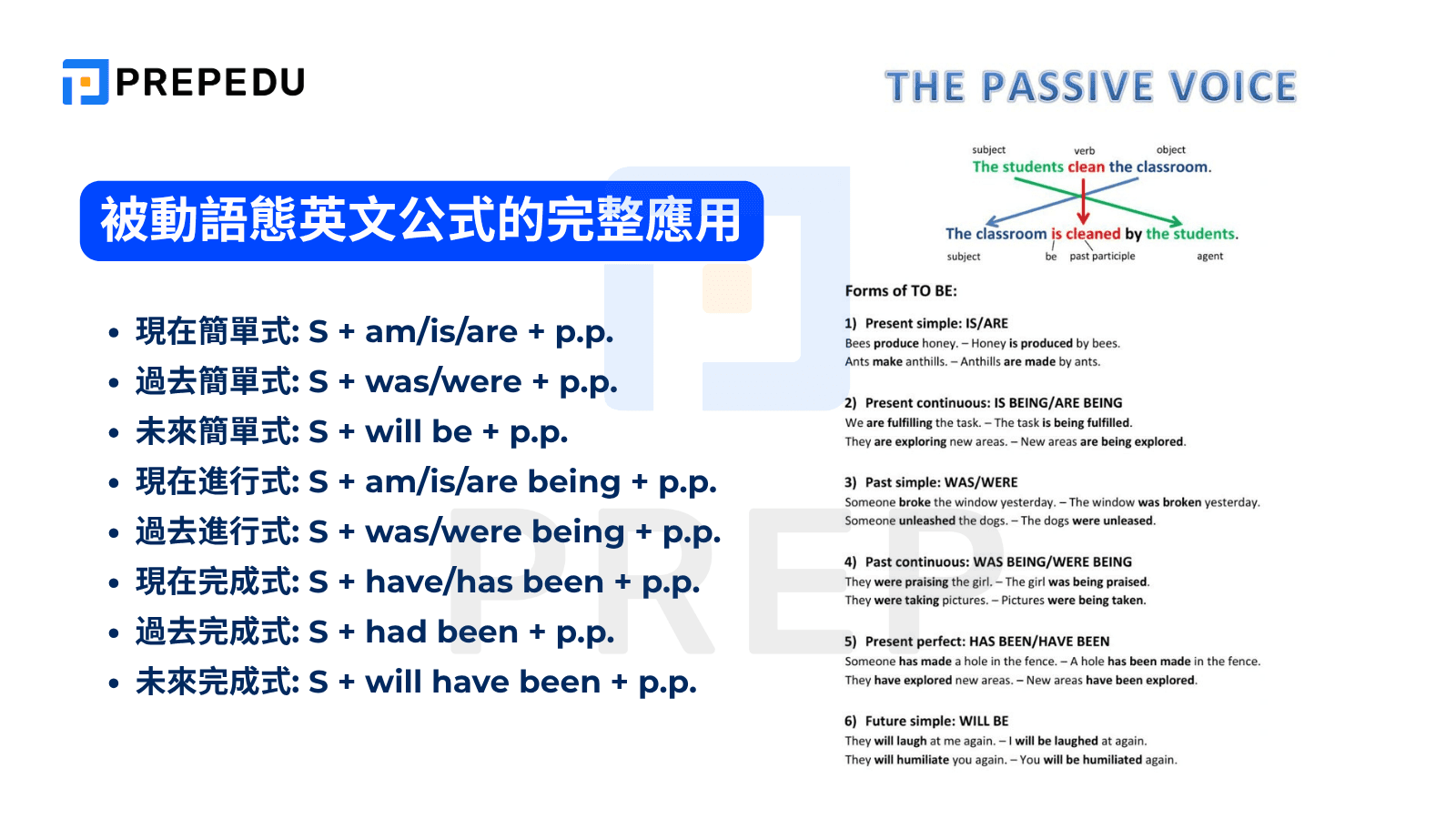被動語態英文全攻略:掌握 Passive Voice 文法,公式與五大句型,輕鬆解鎖英文寫作力
被動語態英文怎麼用?為什麼學習 Passive Voice 這麼重要?被動語態是將句子焦點從「動作執行者」轉移到「動作承受者」的文法結構,使用「be 動詞 + 過去分詞」的固定公式。在 TOEIC,IELTS 等國際考試中,被動語態題目佔文法考題的 15-20%,更在學術論文,新聞報導,商業文件中的使用頻率高達 40%。想像一下,當你閱讀「iPhone was released by Apple」這樣的新聞標題,或在科學報告中看到「The experiment was conducted carefully」,這些都是被動語態的實際應用。
然而,許多台灣和香港的英語學習者在使用被動語態英文時常犯錯誤:忘記在感官動詞被動式中加上 to,誤用不及物動詞的被動形式,或是混淆不同時態的 be 動詞變化。
PREPEDU 為你準備了這份完整攻略,涵蓋被動語態公式,八大時態變化,被動語態五大句型,30 道實戰練習題及詳解,更包含台北,香港真實情境例句。無論你是準備英語考試還是提升職場競爭力,這篇文章將幫助你徹底掌握 Passive Voice 用法,讓英文表達更專業,更有說服力。

I. 被動語態英文是什麼?為何你該學會 Passive Voice 用法?
英文被動語態是什麼(Passive Voice)?被動語態英文是一種將句子焦點從「做動作的人」轉移到「承受動作的人或物」的文法結構。它使用「be 動詞 + 過去分詞」的形式,讓語氣更客觀,更正式。例如:
-
主動句:Xiaowang wrote the report in Taipei.(小王在台北寫了報告。)
-
被動句:The report was written by Xiaowang in Taipei.(報告在台北被小王寫了。)
主動語態英文(Active Voice)強調「誰做了什麼」,而被動語態則將焦點轉移到「什麼被做了」或「誰承受了動作」。被動語態英文常見於新聞報導,科學論文,學術寫作和商業文件中,能有效強調動作本身或承受者,而非執行者。
Passive Voice 怎麼用?Passive Voice 用法主要有三種情況:
-
第一,當動作執行者不明顯或不重要時,例如「My bicycle was stolen in Taipei.」(我的腳踏車在台北被偷了。)——重點是腳踏車被偷,而非誰偷的。
-
第二,想讓語氣更客觀,更正式時,科學報告常用「The experiment was conducted carefully.」(實驗被謹慎執行。)而非「We conducted the experiment carefully」。
-
第三,想強調動作的承受者而非執行者時,例如「English is spoken worldwide.」(英語在全世界被使用。)強調英語的普及性。

II. 被動語態英文的核心秘密:拆解被動語態公式與 be + pp 的文法結構
理解被動語態文法的關鍵,在於掌握其核心公式。被動語態公式:
主詞(承受者)+ be 動詞 + 過去分詞(p.p.)+ (by + 動作執行者)
以「The cake was eaten by Xiaowang at the bakery in Taipei.」(蛋糕在台北的麵包店被小王吃掉了。)為例,我們可以清楚看到:
-
The cake(蛋糕)是承受動作的主詞
-
was 是 be 動詞,根據時態和主詞做變化
-
eaten 是 eat 的過去分詞(p.p.)
-
by Xiaowang 說明誰執行了動作(可省略)
be pp 是什麼? 這是學習被動語態英文時最常見的疑問。「be pp」是「be 動詞 + 過去分詞(past participle)」的縮寫,是構成被動語態的核心元素。
be 動詞的變化規則極為重要。be 動詞會根據時態(現在,過去,未來)和主詞人稱(單數或複數)產生變化:
-
現在式:am/is/are
-
過去式:was/were
-
未來式:will be
-
完成式:have been/has been/had been
過去分詞(p.p.)的構成方式:
-
規則動詞:通常在動詞後加 -ed(例如:clean → cleaned,paint → painted)
-
不規則動詞:需個別記憶(例如:write → written,break → broken,steal → stolen)
讓我們看看被動語態英文的實例:
-
Xiaoli's phone was stolen on the MTR in Hong Kong.(小麗的手機在香港地鐵上被偷了。)
-
The documents have been signed by the manager in Taipei.(這些文件已經被台北的經理簽署了。)
III. 掌握時態與助動詞變化:被動語態英文公式的完整應用
1. 八大時態的被動語態英文變化
掌握不同時態英文的被動語態英文變化是精通 Passive Voice 用法的關鍵。以下表格清楚對比主動語態與被動語態在八大常見時態中的結構差異,每個例句都使用台北,香港的實際情境:
|
時態 |
被動語態 |
被動語態例句 |
|
S + am/is/are + p.p. |
The office in Taipei is cleaned daily by Xiaowang.(台北的辦公室每天被小王清潔。) |
|
|
S + was/were + p.p. |
The wall in Hong Kong was painted by Xiaoli yesterday.(香港的牆壁昨天被小麗粉刷了。) |
|
|
S + will be + p.p. |
A new branch in Taipei will be opened next month.(台北的新分店下個月將被開設。) |
|
|
S + am/is/are being + p.p. |
A bridge in Hong Kong is being built now.(香港的一座橋現在正被建造。) |
|
|
S + was/were being + p.p. |
The computer was being fixed by Xiaoming when I called.(我打電話時,電腦正被小明修理。) |
|
|
S + have/has been + p.p. |
The project in Taipei has been completed by the team.(台北的專案已經被團隊完成了。) |
|
|
S + had been + p.p. |
The package had been sent by Xiaoli before noon.(包裹在中午前已經被小麗寄出了。) |
|
|
S + will have been + p.p. |
The construction will have been finished by December.(建設將在十二月前被完成。) |
這個表格幫助你快速掌握被動語態英文在不同時態中的變化規律。注意 be 動詞如何隨著時態改變形式,這是正確使用被動語態的基礎。
重要提醒:完成進行式(如 have been doing)的被動語態在實際使用中極為罕見,因為句子會變得冗長且不自然,例如「has been being done」。即使在學術寫作中,母語人士也會避免使用這種結構。

2. 情態助動詞的被動語態英文
情態助動詞(Modal Verbs)如 can,should,must,may,might,would,could 等,在被動語態英文中扮演重要角色。這對華語地區學習者來說是特別需要注意的重點文法。
被動語態公式:
主詞 + 情態助動詞 + be + 過去分詞(p.p.)
情態助動詞的被動語態英文例句:
-
This report must be submitted to the Taipei office before Friday.(這份報告必須在星期五前提交給台北辦公室。)
-
The safety regulations should be followed by all employees in Hong Kong.(所有香港員工都應該遵守安全規定。)
-
The password can be reset through the system.(密碼可以透過系統重設。)
-
Xiaowang may be promoted to manager next year.(小王明年可能會被升為經理。)
-
The documents could have been lost during the move to the new Taipei office.(這些文件可能在搬到台北新辦公室時遺失了。)
-
All visitors would be required to register at the reception.(所有訪客都會被要求在接待處登記。)
特別注意:情態助動詞後面的 be 動詞永遠使用原形,不會因主詞或時態而改變。這是被動語態英文中的固定規則,違反這個規則是考試中常見的失分點。
完成式情態助動詞的被動語態英文:
-
The email should have been sent yesterday.(這封郵件昨天就應該被寄出了。)
-
The mistake could have been avoided with more careful planning.(這個錯誤原本可以透過更仔細的規劃避免。)
IV. 進階必學:被動語態英文五大句型與特殊用法詳解
1. 句型一:授與動詞(雙受詞)的被動語態
授與動詞(如 give(給),send(寄),buy(買),tell(告訴),teach(教),show(展示),lend(借給),bring(帶來),make(做),write(寫),offer(提供) 等)的特殊之處在於它們可以接兩個受詞:「間接受詞(人)」和「直接受詞(物)」。因此,被動語態英文五大句型中這類動詞可以產生兩種不同的被動形式。
主動句:Xiaoming gave Xiaoli a birthday gift.(小明送給小麗一份生日禮物。)
-
被動句一:Xiaoli was given a birthday gift by Xiaoming.(小麗被小明送了一份生日禮物。)——將「人」當主詞
-
被動句二:A birthday gift was given to Xiaoli by Xiaoming.(一份生日禮物被小明送給了小麗。)——將「物」當主詞,需加介系詞英文 to 或 for
更多被動語態英文例句:
|
主動句 |
被動句一 |
被動句二 |
|
The Hong Kong manager taught Xiaowang advanced Excel skills.(香港經理教了小王進階的 Excel 技巧。) |
Xiaowang was taught advanced Excel skills by the Hong Kong manager.(小王被香港經理教了進階的 Excel 技巧。) |
Advanced Excel skills were taught to Xiaowang by the Hong Kong manager.(進階的 Excel 技巧被香港經理教給了小王。) |
|
My colleague sent me an urgent email from the Taipei office.(我同事從台北辦公室寄給我一封緊急郵件。) |
I was sent an urgent email by my colleague from the Taipei office.(我被同事從台北辦公室寄了一封緊急郵件。) |
An urgent email was sent to me by my colleague from the Taipei office.(一封緊急郵件被同事從台北辦公室寄給了我。) |
|
Xiaoli's parents bought her a new apartment in Hong Kong.(小麗的父母在香港買給她一間新公寓。) |
Xiaoli was bought a new apartment in Hong Kong by her parents.(小麗被她父母在香港買了一間新公寓。) |
A new apartment in Hong Kong was bought for Xiaoli by her parents.(香港的一間新公寓被她父母買給了小麗。) |
介系詞選擇規則:
-
當「物」作為被動句主詞時,give,send,lend,teach,tell,show,offer 等動詞後面通常接 to
-
而 buy,make,cook,get,find 等動詞後面則接 for。

2. 句型二:使役動詞與感官動詞的被動語態英文
使役動詞(make(使),have(讓),let(允許))和感官動詞(see(看見),hear(聽見),watch(觀看),notice(注意到),feel(感覺),observe(觀察))在主動語態中有個特殊規則:它們後面接原形動詞時會省略 to。但在被動語態文法中,這個 to 必須加回來。
-
主動句:The security guard saw Xiaowang enter the Taipei 101 building.(保全看到小王進入台北 101 大樓。)
-
被動句:Xiaowang was seen to enter the Taipei 101 building.(小王被看到進入台北 101 大樓。)——必須加 to
被動語態用法例句:
|
主動句 |
被動句 |
|
The strict boss made Xiaoli work overtime in the Hong Kong office.(嚴格的老闆讓小麗在香港辦公室加班。) |
Xiaoli was made to work overtime in the Hong Kong office by the strict boss.(小麗被嚴格的老闆要求在香港辦公室加班。) |
|
I heard someone shout for help near Taipei Main Station.(我聽到有人在台北車站附近呼救。) |
Someone was heard to shout for help near Taipei Main Station.(有人被聽到在台北車站附近呼救。) |
|
We watched the children play basketball in the Hong Kong park.(我們看著孩子們在香港公園打籃球。) |
The children were watched to play basketball in the Hong Kong park.(孩子們被看著在香港公園打籃球。) |
|
The supervisor let the team leave early after completing the project.(主管讓團隊在完成專案後提早離開。) |
The team was allowed to leave early after completing the project.(團隊在完成專案後被允許提早離開。)——let 的被動通常用 be allowed to 代替 |
特別注意:「let」的被動語態在實際使用中較為罕見,通常會用「be allowed to」或「be permitted to」來替代,這樣更自然且符合被動語態英文的慣用法。
這是被動語態五大句型中容易出錯的地方,許多學習者會忘記在被動句中還原 to,請特別留意這個規則。

3. 句型三:帶有介系詞的動詞片語被動語態英文
某些動詞會與介系詞結合形成動詞片語(phrasal verbs),如 look at(看、注視)、listen to(聽、傾聽)、take care of(照顧、照料)、laugh at(嘲笑、取笑)、speak to(對…說話、與…交談)、depend on(依賴、依靠)、deal with(處理、應對)、look after(照顧、看護)、look up to(尊敬、仰慕)、call off(取消、終止) 等。在轉換為被動語態英文時,這些介系詞絕對不能省略,必須保持完整。
-
主動句:The experienced nurse took care of Xiaowang's grandmother in the Taipei hospital.(有經驗的護士在台北醫院照顧小王的祖母。)
-
被動句:Xiaowang's grandmother was taken care of by the experienced nurse in the Taipei hospital.(小王的祖母在台北醫院被有經驗的護士照顧。)
更多被動語態英文例句:
|
主動句 |
被動句 |
|
Everyone in the Hong Kong office laughed at Xiaoli's joke during the meeting.(香港辦公室的每個人在會議中都笑了小麗的笑話。) |
Xiaoli's joke was laughed at by everyone in the Hong Kong office during the meeting.(小麗的笑話在會議中被香港辦公室的每個人嘲笑。) |
|
Young professionals look up to the CEO in the Taipei headquarters.(年輕專業人士敬仰台北總部的執行長。) |
The CEO in the Taipei headquarters is looked up to by young professionals.(台北總部的執行長被年輕專業人士敬仰。) |
|
The management team will deal with the customer complaint tomorrow.(管理團隊明天將處理客戶投訴。) |
The customer complaint will be dealt with by the management team tomorrow.(客戶投訴明天將被管理團隊處理。) |
|
You can rely on Xiaoming to finish the Hong Kong project on time.(你可以依靠小明準時完成香港專案。) |
Xiaoming can be relied on to finish the Hong Kong project on time.(可以依靠小明準時完成香港專案。) |
|
They called off the outdoor event in Taipei due to the typhoon.(由於颱風,他們取消了台北的戶外活動。) |
The outdoor event in Taipei was called off due to the typhoon.(由於颱風,台北的戶外活動被取消了。) |
這類動詞片語的被動語態英文在日常英文和考試中都很常見,務必記住整個片語一起轉換,不要拆開處理。這是被動語態文法中的重要考點。

4. 句型四:祈使句的被動語態
祈使句(命令句)的被動語態英文有其特殊結構,使用「Let + 受詞 + be + p.p.」的公式。這種句型在正式指示,規則說明或官方公告中經常出現。
-
主動句:Close all windows before leaving the Taipei office.(離開台北辦公室前關閉所有窗戶。)
-
被動句:Let all windows be closed before leaving the Taipei office.(讓所有窗戶在離開台北辦公室前被關閉。)
被動語態題目常見例句:
|
主動句 |
被動句 |
|
Turn off all electronic devices in the Hong Kong meeting room.(關閉香港會議室的所有電子設備。) |
Let all electronic devices in the Hong Kong meeting room be turned off.(讓香港會議室的所有電子設備被關閉。) |
|
Keep the Taipei office premises clean at all times.(隨時保持台北辦公室場所清潔。) |
Let the Taipei office premises be kept clean at all times.(讓台北辦公室場所隨時保持清潔。) |
|
Submit all reports to the Hong Kong headquarters by Friday.(在星期五前將所有報告提交給香港總部。) |
Let all reports be submitted to the Hong Kong headquarters by Friday.(讓所有報告在星期五前被提交給香港總部。) |
|
Complete this training module before starting work in Taipei.(在台北開始工作前完成這個培訓模組。) |
Let this training module be completed before starting work in Taipei.(讓這個培訓模組在台北開始工作前被完成。) |
雖然祈使句的被動語態英文在口語中較少使用,但在正式寫作,規章制度,官方指示或考試中經常出現,是被動語態五大句型中需要掌握的重要形式。

5. 句型五:表述意見的動詞被動語態(It is said that... / S + be + said to...)
表達「據說」,「人們認為」等意見時,英文常使用 say(說、表示)、think(認為、思考)、believe(相信、認定)、report(報導、報告)、know(知道、瞭解)、expect(期望、預期)、consider(認為、考慮)、understand(理解、明白)、claim(聲稱、主張)等動詞的被動語態英文,有兩種常見句型。這種被動語態用法讓句子顯得更客觀,更正式。
原句:People say that Xiaowang is the best programmer in the Taipei tech company.(人們說小王是台北科技公司最好的程式設計師。)
-
被動句型一(虛主詞 It):It is said that Xiaowang is the best programmer in the Taipei tech company.(據說小王是台北科技公司最好的程式設計師。)
-
被動句型二(真主詞提前):Xiaowang is said to be the best programmer in the Taipei tech company.(小王據說是台北科技公司最好的程式設計師。)
時態轉換的重要規則:當從句的時態早於主句時,要使用「to have + p.p.」的結構。例如:
-
People think that Xiaoming stole the documents.(人們認為小明偷了文件。)——從句是過去式
-
→ Xiaoming is thought to have stolen the documents.(小明被認為偷了文件。)——使用 to have stolen
更多被動語態英文練習例句:
|
主動句 |
被動句型一(虛主詞 It) |
被動句型二(真主詞提前) |
|
People believe that the new Hong Kong MTR line will reduce traffic congestion.(人們相信新的香港地鐵線將減少交通擁堵。) |
It is believed that the new Hong Kong MTR line will reduce traffic congestion.(據信新的香港地鐵線將減少交通擁堵。) |
The new Hong Kong MTR line is believed to reduce traffic congestion.(新的香港地鐵線被認為將減少交通擁堵。) |
|
They reported that the Taipei 101 building swayed during the earthquake.(他們報導說台北 101 大樓在地震期間搖晃。) |
It was reported that the Taipei 101 building swayed during the earthquake.(據報導台北 101 大樓在地震期間搖晃。) |
The Taipei 101 building was reported to have swayed during the earthquake.(台北 101 大樓被報導在地震期間搖晃了。) |
|
Everyone knows that Xiaoli has excellent presentation skills.(每個人都知道小麗有出色的簡報技巧。) |
It is known that Xiaoli has excellent presentation skills.(眾所周知小麗有出色的簡報技巧。) |
Xiaoli is known to have excellent presentation skills.(小麗以擁有出色的簡報技巧而聞名。) |
|
People think that the company will expand to other Asian markets.(人們認為公司將擴展到其他亞洲市場。) |
It is thought that the company will expand to other Asian markets.(據認為公司將擴展到其他亞洲市場。) |
The company is thought to expand to other Asian markets.(公司被認為將擴展到其他亞洲市場。) |
這種被動語態英文在新聞報導,學術寫作中極為常見,是被動語態五大句型中最具專業性的表達方式。

V. 如何形成被動語態英文問句與疑問句?
1. Yes/No 問句的被動語態
形成被動語態英文問句時,只需將 be 動詞或情態助動詞移至句首,其他部分保持被動語態結構不變。這是被動語態疑問句最基本的轉換方式。
-
直述句:The new product was launched in the Taipei store yesterday.(新產品昨天在台北商店推出了。)
-
被動語態問句:Was the new product launched in the Taipei store yesterday?(新產品昨天在台北商店推出了嗎?)
更多被動語態英文問句範例:
|
主動句 |
被動句 |
|
The contract documents have been signed by both parties.(合約文件已經被雙方簽署了。) |
Have the contract documents been signed by both parties?(合約文件已經被雙方簽署了嗎?) |
|
All employees in Hong Kong must be vaccinated before returning to office.(香港所有員工在返回辦公室前必須接種疫苗。) |
Must all employees in Hong Kong be vaccinated before returning to office?(香港所有員工在返回辦公室前必須接種疫苗嗎?) |
|
New staff members are being trained in the Taipei headquarters this week.(新進員工本週在台北總部接受培訓。) |
Are new staff members being trained in the Taipei headquarters this week?(新進員工本週在台北總部接受培訓嗎?) |
|
The final decision will be made by the board of directors tomorrow.(最終決定明天將由董事會做出。) |
Will the final decision be made by the board of directors tomorrow?(最終決定明天將由董事會做出嗎?) |
2. Wh- 問句的被動語態英文
當你需要詢問特定資訊時,將 WH 問句(Who,What,When,Where,Why,How)置於句首,後面接 Yes/No 問句的結構即可形成被動語態英文疑問句。
範例結構:
疑問詞 + be 動詞/助動詞 + 主詞 + 過去分詞...?
被動語態練習題範例:
-
Why was Xiaowang's proposal rejected by the Hong Kong management team?(小王的提案為什麼被香港管理團隊拒絕?)
-
When will the new Taipei MRT line be completed?(台北新的捷運線何時會完成?)
-
How was the cyber security problem solved by the IT department?(資安問題如何被資訊部門解決?)
-
Where were these promotional materials printed for the Hong Kong campaign?(這些宣傳材料在哪裡為香港活動印刷的?)
-
By whom was this innovative system designed for the Taipei office?(這個創新系統是誰為台北辦公室設計的?)
-
What will be discussed at tomorrow's meeting in Hong Kong?(明天在香港的會議將討論什麼?)
特別注意:當疑問詞是主詞時,不需要倒裝。例如:
-
What was stolen from Xiaoli's desk in the Taipei office?(小麗在台北辦公室的桌子被偷了什麼?)——What 是主詞,不倒裝
-
Who was invited to the Hong Kong regional conference?(誰被邀請參加香港地區會議?)——Who 是主詞,不倒裝
掌握被動語態問句的形成方式,能讓你在日常溝通,商業會議和考試中更靈活運用被動語態英文。
VI. 被動語態英文的常見錯誤與避免方法
1. 忘記使用被動語態
常見錯誤:當主詞是動作的承受者時,學習者常忘記使用被動語態,直接用主動形式。
錯誤範例:
|
❌ The new policy implemented by the Taipei headquarters last week. |
✅ The new policy was implemented by the Taipei headquarters last week.(新政策上週由台北總部實施。) |
|
❌ Xiaoli's proposal rejected by the Hong Kong committee. |
✅ Xiaoli's proposal was rejected by the Hong Kong committee.(小麗的提案被香港委員會拒絕了。) |
避免方法:判斷主詞與動詞的關係——如果主詞「承受」動作而非「執行」動作,就必須使用被動語態英文。
2. 誤用不及物動詞的被動形式
常見錯誤:將不及物動詞(vi)誤用為被動語態英文。
錯誤範例:
|
❌ The meeting was happened in the Taipei conference room. |
✅ The meeting happened in the Taipei conference room.(會議在台北會議室舉行了。) |
|
❌ Xiaowang's success was belonged to his hard work. |
✅ Xiaowang's success belonged to his hard work.(小王的成功歸功於他的努力。) |
避免方法:記住 happen(發生)、occur(發生)、take place(舉行、發生)、belong to(屬於)、consist of(由…組成)、appear(出現、顯現)、seem(似乎、看起來) 等動詞不能用於被動語態。
3. 感官動詞和使役動詞被動時忘記加 to
常見錯誤:在感官動詞(see,hear,watch)和使役動詞(make)的被動語態英文中忘記還原 to。
錯誤範例:
|
❌ Xiaoli was seen leave the Hong Kong office at midnight. |
✅ Xiaoli was seen to leave the Hong Kong office at midnight.(小麗被看到在午夜離開香港辦公室。) |
|
❌ Xiaowang was made work overtime in Taipei. |
✅ Xiaowang was made to work overtime in Taipei.(小王被要求在台北加班。) |
避免方法:記住公式——「主動省 to,被動還原 to」。
4. By 短語位置錯誤或不當使用
常見錯誤:錯誤放置 by 短語,或在不必要時使用 by。
錯誤範例:
|
❌ Was repaired the computer by Xiaoming in Taipei? |
✅ Was the computer repaired by Xiaoming in Taipei?(電腦在台北被小明修理了嗎?) |
|
❌ The report was written by someone. |
✅ The report was written. (省略不明確的 by someone)(報告被寫好了。) |
避免方法:by 短語通常放在句尾,且當動作執行者不明確或不重要時應省略。
5. 時態混淆
常見錯誤:被動語態英文中的 be 動詞時態與句子整體時態不符。
錯誤範例:
|
❌ The Hong Kong office is established in 1995. |
✅ The Hong Kong office was established in 1995.(香港辦公室於 1995 年成立。) |
|
❌ The Taipei project was being completed since last week. |
✅ The Taipei project has been completed since last week.(台北專案自上週以來已經完成。) |
避免方法:根據時間副詞判斷正確時態,確保 be 動詞形式與時態一致。
VII. 被動語態英文練習題(含詳解)
1. 練習一:主動句改寫為被動句
請將以下主動語態句子改寫為被動語態。這些被動語態題目涵蓋了各種時態和句型,並使用台北,香港真實情境,能有效檢驗你對 Passive Voice 用法的理解。
題目:
-
The IT department is upgrading all computers in the Taipei office.
-
Someone has stolen Xiaowang's bicycle from the Hong Kong parking lot.
-
The construction company will build a new shopping mall in Taipei next year.
-
People speak Cantonese widely in Hong Kong.
-
Xiaoli's supervisor taught her advanced data analysis techniques.
-
You must submit the quarterly report to the Hong Kong headquarters by 5 PM.
-
Did the typhoon damage the Taipei office building?
-
Nobody saw Xiaoming leave the Hong Kong meeting room.
-
The company is going to hire ten new engineers for the Taipei R&D center.
-
A famous Taiwanese chef prepared the banquet for the Hong Kong delegates.
解答:
-
All computers in the Taipei office are being upgraded by the IT department.(台北辦公室的所有電腦正被資訊部門升級。)——現在進行式被動
-
Xiaowang's bicycle has been stolen from the Hong Kong parking lot.(小王的腳踏車已經從香港停車場被偷了。)——現在完成式被動,動作者不明可省略 by
-
A new shopping mall in Taipei will be built by the construction company next year.(台北的一個新購物中心明年將被建設公司建造。)——未來簡單式被動
-
Cantonese is spoken widely in Hong Kong.(粵語在香港被廣泛使用。)——現在簡單式被動,強調普遍事實
-
Xiaoli was taught advanced data analysis techniques by her supervisor. / Advanced data analysis techniques were taught to Xiaoli by her supervisor.(小麗被她的主管教授了進階數據分析技巧。/ 進階數據分析技巧被她的主管教給了小麗。)——授與動詞雙受詞被動
-
The quarterly report must be submitted to the Hong Kong headquarters by 5 PM.(季度報告必須在下午 5 點前提交給香港總部。)——情態助動詞被動
-
Was the Taipei office building damaged by the typhoon?(台北辦公大樓被颱風損壞了嗎?)——過去簡單式被動問句
-
Xiaoming was not seen to leave the Hong Kong meeting room.(小明沒有被看到離開香港會議室。)——感官動詞被動需加 to
-
Ten new engineers are going to be hired by the company for the Taipei R&D center.(十名新工程師將被公司聘用到台北研發中心。)——be going to 未來式被動
-
The banquet for the Hong Kong delegates was prepared by a famous Taiwanese chef.(為香港代表團準備的宴會由一位著名的台灣廚師準備。)——過去簡單式被動
2. 練習二:動詞形式填空
請填入動詞的正確被動語態英文形式。這些被動語態練習測試你對不同時態和結構的掌握程度,所有例句使用台北,香港真實情境。
題目:
-
The new Taipei MRT station _________ (open) last month.
-
This confidential information _________ (must / protect) from unauthorized access.
-
Right now, the Hong Kong presentation slides _________ (prepare) by Xiaoli's team.
-
The final decision _________ (not make) yet by the Taipei management.
-
Xiaowang _________ (promote) to team leader by the Hong Kong office yesterday.
-
All meeting rooms in Taipei _________ (already / book) for next week.
-
This type of technology _________ (can / implement) in both Hong Kong and Taipei offices.
-
The interns _________ (tell) to arrive at the Taipei office by 9 AM.
-
I believe a serious mistake _________ (make) in the Hong Kong financial report.
-
These award-winning photos _________ (take) by Xiaoli when she visited Taipei 101.
解答:
-
was opened(台北新的捷運站上個月開幕了。)——過去簡單式被動,last month 是過去時間
-
must be protected(這些機密資訊必須受到保護,防止未經授權的訪問。)——情態助動詞 + be + p.p.
-
are being prepared(現在,香港簡報投影片正由小麗的團隊準備。)——現在進行式被動,right now 表示正在進行
-
has not been made(最終決定尚未由台北管理層做出。)——現在完成式被動,yet 表示尚未
-
was promoted(小王昨天被香港辦公室晉升為組長。)——過去簡單式被動,yesterday 是過去時間
-
have already been booke (台北所有會議室下週都已經被預訂了。)——現在完成式被動,already 表示已經
-
can be implemented(這種類型的技術可以在香港和台北辦公室實施。)——情態助動詞被動,表示可能性
-
were told(實習生被告知要在早上 9 點前到達台北辦公室。)——過去簡單式被動,tell 的被動用法
-
has been made(我相信香港財務報告中犯了一個嚴重的錯誤。)——現在完成式被動,believe 表示推測現在的結果
-
were taken(這些獲獎照片是小麗參觀台北 101 時拍攝的。)——過去簡單式被動,photos 是複數主詞
3. 練習三:選擇題
請選出正確的被動語態英文選項。這些 Passive Voice 練習涵蓋了常見的考試題型和易錯點,使用台北,香港實際情境。
題目:
-
The Hong Kong conference room _________ by the cleaning staff every evening.
(A) is cleaning (B) is cleaned (C) cleans (D) has cleaned -
Xiaowang's missing laptop _________ in the Taipei office storage room yesterday.
(A) found (B) was found (C) has found (D) was finding -
All the project documents _________ by the time the Hong Kong clients arrived.
(A) had finished (B) has been finished (C) had been finished (D) was finishing -
These old buildings in Taipei _________ down next month for urban renewal.
(A) are going to tear (B) will be teared (C) are going to be torn (D) will tear -
Xiaoli was seen _________ the Hong Kong office very late last night.
(A) to leave (B) leave (C) leaving (D) left -
All sensitive data must _________ care of properly in the Taipei server room.
(A) be taken (B) take (C) be took (D) to be taken -
It is believed that the new Taipei MRT line _________ thousands of commuters daily.
(A) benefits (B) is benefiting (C) will benefit (D) will be benefited -
By whom _________ this innovative app designed for Hong Kong users?
(A) is (B) did (C) was (D) has -
Xiaoming's car needs _________. It broke down on the way to Taipei.
(A) to fix (B) fixing (C) to be fixing (D) be fixed -
"Xiaowang was given a promotion by the Hong Kong management." This sentence can also mean:
(A) The Hong Kong management was given a promotion.
(B) A promotion gave Xiaowang to the Hong Kong management.
(C) The Hong Kong management gave Xiaowang a promotion.
(D) Xiaowang gave a promotion to the Hong Kong management.
解答:
-
(B) is cleaned(香港會議室每天晚上都被清潔人員清潔。)——現在簡單式被動,every evening 表示習慣
-
(B) was found(小王遺失的筆記型電腦昨天在台北辦公室儲藏室被找到了。)——過去簡單式被動,yesterday 表示過去
-
(C) had been finished(當香港客戶到達時,所有專案文件都已經完成了。)——過去完成式被動,by the time 表示在過去某時間點之前完成
-
(C) are going to be torn(台北的這些舊建築下個月將因都市更新而被拆除。)——be going to 未來式被動,tear 的過去分詞是 torn
-
(A) to leave(小麗昨晚很晚被看到離開香港辦公室。)——感官動詞 see 的被動語態必須還原 to
-
(A) be taken(台北伺服器室的所有敏感數據必須妥善保管。)——take care of 是動詞片語,must 後接 be + p.p.
-
(C) will benefit(據信台北新的捷運線每天將使數千名通勤者受益。)——benefit 在此為不及物動詞,不用被動
-
(C) was(這個為香港用戶設計的創新應用程式是誰設計的?)——過去簡單式被動疑問句,app 是單數且時間為過去
-
(B) fixing(小明的車需要修理。它在去台北的路上拋錨了。)——need + V-ing 是主動形式表被動意義
-
(C) The Hong Kong management gave Xiaowang a promotion.(香港管理層給了小王一個晉升。)——授與動詞的雙受詞句型轉換
結論
透過這份完整的被動語態英文全攻略,你已經系統性地掌握了 Passive Voice 的核心文法,被動語態公式,被動語態五大句型,以及各種時態的應用方式。
被動語態文法不僅是考試的重點,更是實際溝通中不可或缺的技能。無論是在台北的商業會議,香港的學術研討會,還是國際郵件往來中,正確使用 Passive Voice 用法都能讓你的英文表達更專業,更有說服力。記住,語言學習需要持續練習——每天閱讀英文文章時留意被動語態的使用,在寫作時有意識地運用被動語態五大句型,並定期完成被動語態練習題來檢驗學習成果。
對 IELTS 和 TOEIC 考試格式感到不熟悉?陌生的考試環境會影響你的得分機會。PREPEDU Test Practice 重現真實考場氛圍,針對 IELTS 四項技能和 TOEIC 商務英語情境進行優化,幫助你掌握題型和答題節奏。
豐富的雅思考題和多益題庫推薦涵蓋超過一千道精選練習題,持續更新以追蹤考試趨勢,收錄高頻題目。智能分析工具深入檢視每個錯誤,提供客製化學習建議,助你快速突破瓶頸。
獨特的視覺化學習路徑讓你在每個階段見證顯著進步。成功就在眼前。把握機會拉開與對手的差距。
立即開始 PREPEDU Test Practice,自信迎接挑戰。今天就免費試用 PREPEDU Test Practice!

你好!我叫黃秋賢。現在在網站 prepedu.com 的部落格擔任產品內容經理。
我有超過5年的英語、韓語等外語自學經驗,並準備過 IELTS、TOEIC、TOPIK 等考試,累積了豐富的實戰知識,也曾協助數千位在語言學習上遇到困難的人。希望以上的分享能幫助大家在家中更有效率地自學!
評論











